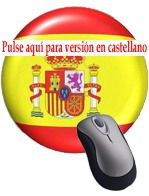
Among the activities in which I have been involved should be cited my participation in events and conferences, on the other hand a very enriching experience that allows to meet new friends and connect with other fans of J.R.R. Tolkien. The exchange of ideas and the sharing of knowledge is fantastic.
Universidades
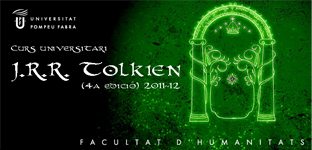 In addition to my visits to the University of Alicante (my alma mater) in order to conduct lectures and presentations on Tolkien, probably my main relation with university linked to Tolkien are my interventions in official university courses on him.
In addition to my visits to the University of Alicante (my alma mater) in order to conduct lectures and presentations on Tolkien, probably my main relation with university linked to Tolkien are my interventions in official university courses on him.
So, in April 2008 I was invited by the University of the Balearic Islands as a lecturer to deliver a conference in the course "Influences on Tolkien's work." My talk was on the Spanish connection to Tolkien.
Later, at the University Pompeu Fabra of Barcelona were held in 2009 and 2012 two separate courses on Tolkien and I was invited to participate in both seminars. In 2009 I gave a talk on Tolkien and the Spanish Civil War. In 2012 the chosen theme was the non-canonical influences on Tolkien.
It should be noted that these are official courses, with appreciation curriculum, which, on the other hand, is a great news for the Spanish Tolkien Scholarship.
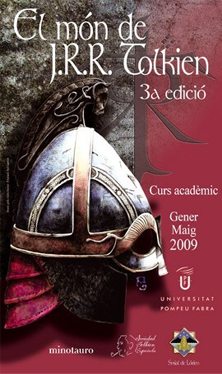
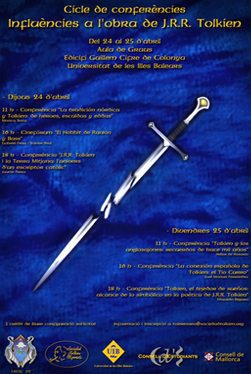
![]()
The Return of the Ring
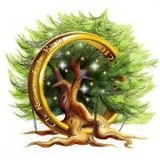 The Return of the Ring
is probably going to become the most important international event of the decade. Organized by the Tolkien Society and held at Loughborough University, its antecedents are the events organized in 1992 for the centenary of Tolkien and in 2005 for the 50th anniversary of The Lord of the Rings. The Return of the Ring commemorated the 75th anniversary of the publication of The Hobbit.
The Return of the Ring
is probably going to become the most important international event of the decade. Organized by the Tolkien Society and held at Loughborough University, its antecedents are the events organized in 1992 for the centenary of Tolkien and in 2005 for the 50th anniversary of The Lord of the Rings. The Return of the Ring commemorated the 75th anniversary of the publication of The Hobbit.
There were a different range of activities, although numerous talks and lectures were held. I participated with the lecture: "JRR Tolkien's second father: Fr Francis Morgan and other non-canonical influences".
A review of my panel by Troels Forchhammer: In the second time slot, I went to a session titled Biography. The first speaker was José Manuel Ferrández Bru who gave a talk titled 'J.R.R. Tolkien's second father: Fr. Francis Morgan and other non-canonical influences.'. For the most part this talk covered some of the same ground as Bru's article in Tolkien Studies VIII, but this time with the addition of illustrations which at some points brought Bru's points out better than the article (pictures of letters, for instance). This time round, I was also more intrigued by Bru's suggestion that the inspiration for the wind-riddle in The Hobbit should be sought in a Spanish poem by one of Fr. Francis' family members, which stood in Fr. Francis' library. Towards the end, Bru suggested, half-jokingly I think, that there might be some echoes of Fr. Francis' influence on Tolkien in some specifics of Tolkien's fiction - apart from the wind-riddle, the Barrels out of Bound chapter might reflect also Fr. Francis' family's involvement with the sherry business, Minas Tirith may derive some qualities from a Spanish town (white houses, mountainous location), and the scouring of the Shire may owe something to the Spanish casting out Napoleon.
Here is available the chronicle of the event that I wrote for the Spanish Tolkien Society (in Spanish).
More
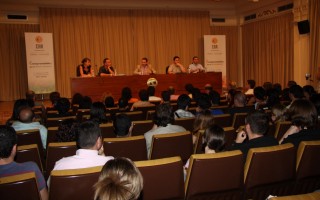 In 2007 the Caja de Ahorros del Mediterráneo held a conference on Tolkien in Alicante titled "Tolkien: Myth, Truth, World" and I was invited to share a panel with scholars Eduardo Segura and Paul Ginés.
In 2007 the Caja de Ahorros del Mediterráneo held a conference on Tolkien in Alicante titled "Tolkien: Myth, Truth, World" and I was invited to share a panel with scholars Eduardo Segura and Paul Ginés.
These conferences were the inspiration to the cycle of lectures "Tolkien: Beyond the Screen" (sponsored by the same entity and held in Elche, my town) where I participated actively in its organization as technical coordinator. One of the panelist was Adam Tolkien (grandson of the author).
On both occasions, the conferences were not aimed at a specialized audience so the purpose was to approach to the works of Tolkien and introduce the key aspects of his biography.
A brief summary of the days of Elche can be seen here and here is available a transcript of the speech of Adam Tolkien (both in Spanish). Moreover, this is the brochure and these are some reviews appeared in press: 1 2 3 4 5
Sociedad Tolkien Española
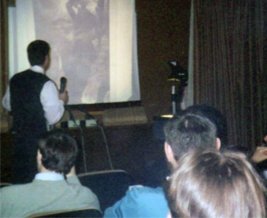 With Spanish Tolkien Society, either representing it in its early stages or in any of its events is where maybe I participated more frequently.
With Spanish Tolkien Society, either representing it in its early stages or in any of its events is where maybe I participated more frequently.
The EstelCon, its annual meeting, is a key point in the year for its members and for the fans and Spanish Tolkien scholars. Its celebration is a turning point in the year, where the works made throughout the year are presented. Since its first edition in 1994, this event was the place where many of my projects, personal or collective, have seen the light.
Alongside the national activities of the Spanish Tolkien Society, I also promote and share activities as lectures and presentations of the Smial of Mithlond, the local branch of the Spanish Tolkien Society in Alicante at the southeast of Spain.
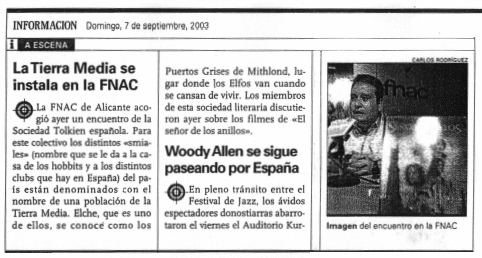 |



